Thyroid disorders are a growing health concern in India, affecting millions of people across different age groups. The thyroid gland, which regulates the body’s metabolism, can either become overactive (hyperthyroidism) or underactive (hypothyroidism). According to the Indian Thyroid Society, around 42 million Indians suffer from thyroid disorders, with hypothyroidism being the most common. Despite its prevalence, thyroid conditions are often misunderstood, leading to several myths and misconceptions. These myths can hinder proper diagnosis and management, delaying the treatment that patients need. In this article, we debunk 10 common myths about thyroid problems with accurate, research-based information. (Source)
10 Myths About Thyroid Problems
Myth 1: Only women suffer from thyroid disorders.
Fact: Although thyroid problems are more common in women, men can also suffer from thyroid disorders. Studies show that 1 in 10 men in India may develop thyroid problems in their lifetime. Both genders can experience issues like hypothyroidism and hyperthyroidism, although symptoms may present differently in men.
Myth 2: Thyroid problems are rare in children.
Fact: Thyroid disorders can affect children, too. Congenital hypothyroidism is a condition where babies are born with an underactive thyroid, and if left untreated, it can lead to developmental issues. In India, neonatal thyroid screening is recommended in some states to catch this condition early. (Source)
Myth 3: Weight gain or loss is always due to a thyroid issue.
Fact: While thyroid dysfunction can cause weight changes, not all cases of weight gain or loss are due to thyroid issues. Poor diet, lifestyle choices, and other medical conditions can also affect weight. It’s important to have proper testing done before attributing weight issues solely to thyroid dysfunction.
Myth 4: Hypothyroidism can be cured with diet alone.
Fact: Although a healthy diet is important for overall well-being, hypothyroidism cannot be cured with diet alone. Patients with hypothyroidism require thyroid hormone replacement therapy to manage their condition. Certain foods, like iodine-rich ones, can help, but they are not a substitute for medication. (Source)
Myth 5: If your thyroid tests are normal, you don’t have thyroid issues.
Fact: Thyroid tests measure TSH, T3, and T4 levels, but some people may still have symptoms of thyroid disorders even if their tests are within normal ranges. This is called subclinical hypothyroidism or euthyroid sick syndrome, where symptoms persist but hormone levels remain normal.
Myth 6: Thyroid disorders are always hereditary.
Fact: While there is a genetic component to thyroid disorders, they are not always inherited. Lifestyle factors, exposure to environmental toxins, and autoimmune conditions can also contribute to the development of thyroid problems. Just because one family member has a thyroid disorder doesn’t mean everyone will. (Source)
Myth 7: You only need to check your thyroid for symptoms.
Fact: Many thyroid conditions are asymptomatic in the early stages. Regular screening is recommended for people with risk factors such as family history, autoimmune diseases, or a history of radiation exposure to the neck. Detecting thyroid issues early can prevent complications down the line. (Source)
Myth 8: Iodine deficiency is the most common cause of thyroid problems in India today.
Fact: While iodine deficiency was once a leading cause of thyroid issues, thanks to the widespread use of iodized salt, iodine deficiency is no longer the most common cause. Autoimmune conditions like Hashimoto’s thyroiditis now account for a large portion of thyroid problems in India.
Myth 9: Thyroid disorders can always be felt as a lump in the neck.
Fact: Thyroid problems do not always present as a visible goiter or lump in the neck. Many people with thyroid dysfunction have no visible signs, and the condition is only detected through blood tests or imaging studies like ultrasound.
Myth 10: Thyroid medications cause harmful side effects.
Fact: Thyroid hormone replacement therapy, when taken at the correct dose, has minimal side effects. Problems arise only when the dosage is too high or too low. Regular monitoring and adjustments ensure the medication works effectively without adverse effects.
FAQs on Thyroid Problems
Q1: How common are thyroid disorders in India?
A1: Thyroid disorders affect around 42 million people in India, with hypothyroidism being the most prevalent.
Q2: Can thyroid disorders be reversed?
A2: Conditions like hypothyroidism usually require lifelong treatment, but some cases of hyperthyroidism can be managed or treated with medication, surgery, or radioiodine therapy.
Q3: Can stress cause thyroid problems?
A3: While stress doesn’t directly cause thyroid problems, it can exacerbate symptoms or trigger autoimmune reactions in individuals prone to thyroid disorders.
Q4: Is it safe to take thyroid medication during pregnancy?
A4: Yes, it is important for pregnant women with thyroid conditions to take their medication, as untreated thyroid issues can lead to complications for both mother and baby.
Q5: Can lifestyle changes improve thyroid health?
A5: Yes, maintaining a balanced diet, regular exercise, and managing stress can improve overall thyroid health, but medication is essential for managing most thyroid conditions.
Conclusion
Thyroid disorders are a significant health concern in India, yet many misconceptions about the condition persist. By debunking these common myths, we hope to spread awareness and encourage people to seek proper diagnosis and treatment. Whether through medication or lifestyle changes, thyroid problems can be managed effectively with the right approach.





